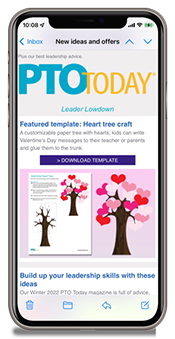As a parent group leader, you might not think "salesman" is part of your job description, but it is—and not just for fundraisers.
Despite the popular perception, sales doesn't mean harassing people until they buy your product whether they need it or not. And salesmen aren't just arm-twisters and pesterers. At its best, the sales process involves bringing together a need and a means to fill it. You need a new mattress, so you go to the mattress store. They'll have 50 you can lie down on to see which one you like.
Parent group leaders aren't peddling a product per se, but you sell your group and your activities all the time. You sell parents on why they should participate. You sell the board on new ideas. You sell the principal on why opening the school for an all-day carnival on a Saturday would be a good idea. You sell the teachers on why they should distribute flyers and fundraising information in class.
How you sell can determine how successful you are. Learning a few basic sales techniques will help you become a more effective leader.
Five Sales Techniques
1. Focus on your client. Nobody likes to be told what's good for them, so good salesmen don't tell people what they ought to do. Instead, they express information in terms of benefits for the client. For example, don't tell people they should get involved because it's the right thing to do. Tell them how involvement benefits their children; tell them about the fun they can have and the sense of accomplishment they'll get in working with you.
2. Be prepared to counter objections. If you know the principal won't want to open the school on Saturday because the custodian will have to work overtime, come up with some alternatives before you ask. Maybe you can fund the overtime or shorten the hours of the event or schedule it on a day the school would have to be open anyway. The point is, before you present a plan, think about it from the other person's perspective. Consider possible objections, and brainstorm ways to get around those objections.
3. Be a resource. If you call a roofer, you want him to be able to tell you about the different kinds of roofing material, the advantages and disadvantages of each, and the relative costs. The roofer knows he may not make a sale right now, but he's building a relationship with you by acting as a resource. You can be a resource about the school for parents by providing information ranging from school calendars to bus routes to what to expect at parent-teacher conferences.
4. Treat existing customers like gold. As a rule, it's five times more expensive to get a new customer than to keep an existing one. Think about how much time and effort you spend trying to convince parents to participate in your activities and to volunteer. Yet once a person starts volunteering, it's easy to take her for granted. After all, you've already won her over; you're more focused on convincing other parents that they should get involved, too. Once somebody does start helping out, it's not hard to make sure she has a positive experience and knows she's appreciated. It's not hard, but it is important.
5. Always follow through. Imagine what would happen to a salesman if he set up a meeting with a client and then didn't show up. Or said he'd have a quote for an important job by a certain date and then didn't send it until a week later. The message to the client is "You're not important to me." The same thing happens if you skip a meeting with the principal or fail to get information about school events to a parent who asked, for example.
Your bottom line isn't convincing people to buy, it's to buy in to the good things your group can do. Looking at your role from a sales perspective will help you focus on what you can do for parents rather than what they can do for you. And that change in perspective can make a world of difference for your group.
























